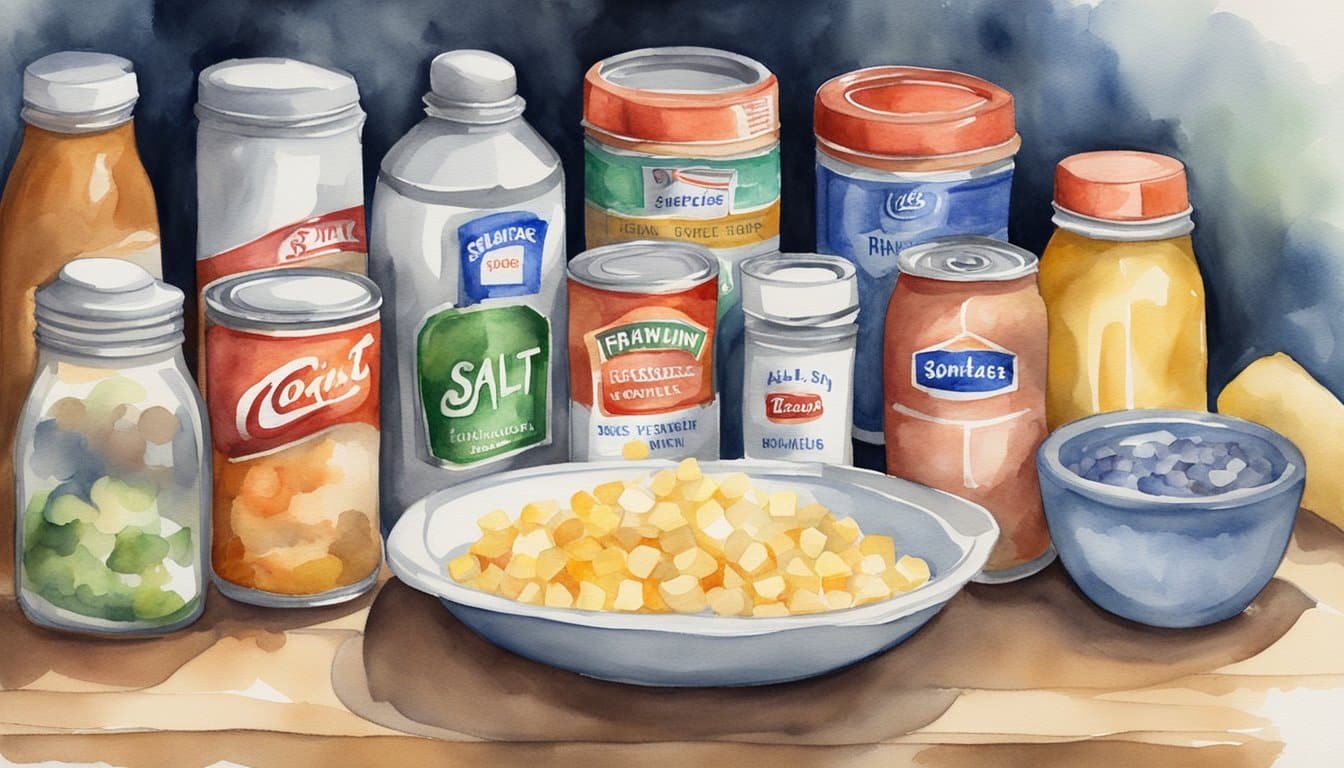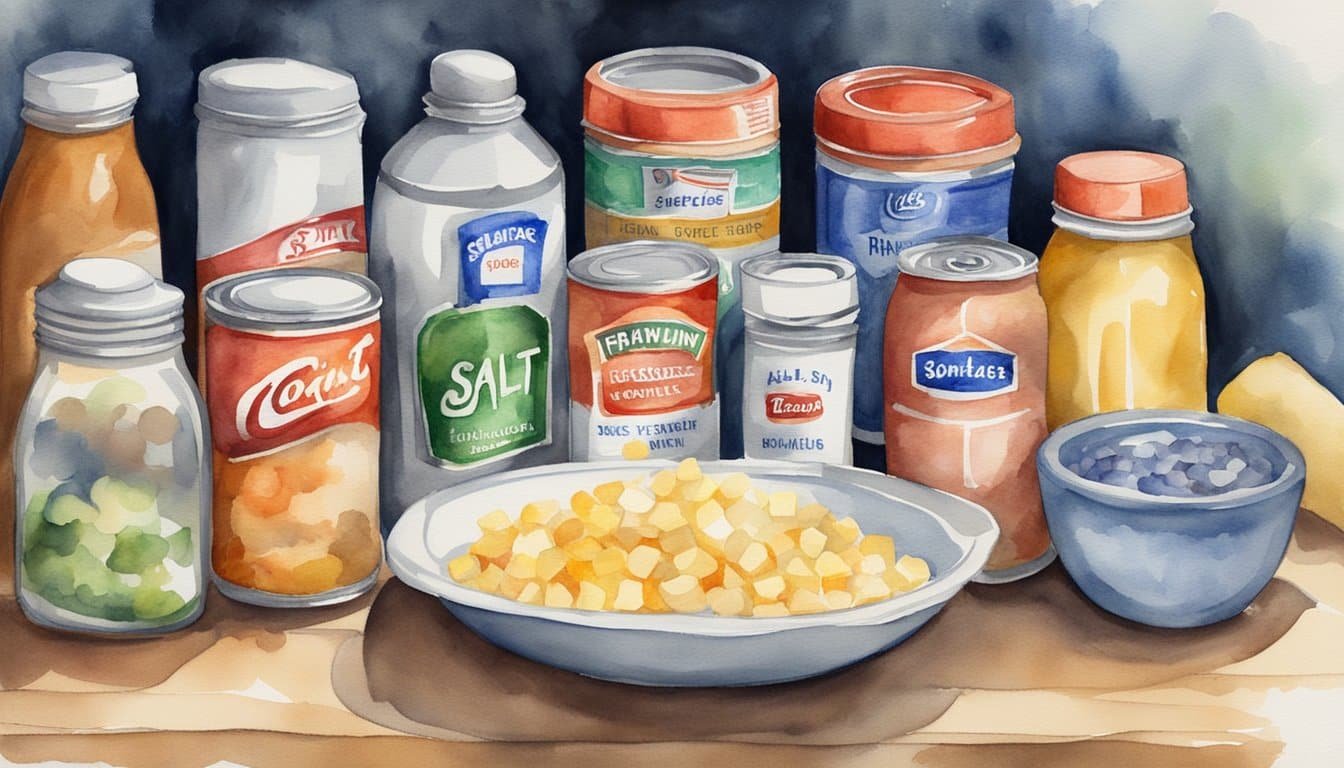Understanding Sodium and Weight
When it comes to sodium and body weight, there’s more to consider than just calorie content. Sodium plays a critical role in the body but can also influence water retention, which affects overall weight.
Sodium’s Role in the Body
Sodium is an essential mineral that’s key for maintaining fluid balance, transmitting nerve impulses, and contracting muscles. It’s needed for the body to create energy and carry out its everyday functions. Despite its importance, the body needs sodium in relatively small quantities, and most diets worldwide provide more than enough.
Weight Gain vs. Water Retention
Contrary to what some might think, sodium doesn’t directly contribute to fat gain. Instead, excess sodium consumption can lead to fluid retention, making individuals feel bloated and potentially increasing body weight temporarily. This is because the body holds onto the additional water to balance out the extra sodium. Persistent fluid retention can lead to hypertension and affect fluid levels crucial for a healthy body. It’s essential to distinguish between weight gain from an increase in body fat and weight fluctuation due to varying fluid levels in the body.
Dietary Sodium Sources and Recommendations

While sodium is a necessary nutrient for the body, high consumption is commonly linked to increased water weight and can affect blood pressure. This section explores key points regarding where sodium is found in the diet, particularly in processed foods, and outlines the guidelines for daily sodium intake.
Processed Foods and Sodium Content
Processed foods are major contributors to sodium intake in the American diet. Items such as frozen dinners, fast food, and snacks often contain high levels of sodium which serves as a preservative and flavor enhancer. For example, a single slice of pizza can contain between 500 to 800 milligrams of sodium. Similarly, a fast food burger may have over 1,000 milligrams. This high sodium content in processed foods not only impacts blood pressure but also leads to holding onto extra water weight.
Daily Sodium Intake Guidelines
The CDC and FDA recommend that Americans limit their intake of sodium. The Dietary Guidelines for Americans advises a maximum of 2,300 milligrams per day, which equates to about one teaspoon of table salt. However, for optimal heart health, a further reduction to 1,500 milligrams is suggested, especially for those with high blood pressure. It’s important to note that the body also requires nutrients like potassium and fiber, which can be found in fruits and vegetables, to balance sodium levels and support overall health.
Health Impacts of Excess Sodium

While sodium is essential for nerve cell function and other bodily processes, it’s important to moderate sodium intake. Excessive consumption can lead to significant health issues, particularly concerning heart and kidney health.
Link Between Sodium and Health Conditions
Excessive sodium often comes from a diet high in salty foods and highly processed foods, which can be a path to various health problems. Specifically, a high salt diet is associated with an increased risk of heart disease and stroke. Men and women who consume too many salty foods like cheese or processed snacks may experience a rise in blood pressure, which is a significant risk factor for heart attack and heart failure. Furthermore, increased sodium can contribute to kidney disease, as the kidneys struggle to filter the excess sodium from the bloodstream. It’s not just about calories; it’s the sodium in those calories that can cause problems.
- Heart disease: Increased risk linked to high sodium
- Stroke: Elevated blood pressure from high sodium can lead to strokes
- Kidney disease: Kidneys are strained by excessive sodium filtering
Sodium can also affect one’s body mass index (BMI) and waist circumference indirectly through bloating or swelling, known as edema. Although sodium doesn’t directly add calories, it can increase appetite, leading to a higher calorie intake, and contributes to obesity. The American Heart Association warns that keeping an eye on sodium intake during grocery shopping and meal preparation can help dodge these unwanted effects.
- Appetite: High sodium can stimulate appetite, increasing calorie intake
- Obesity: Indirectly linked through increased calorie consumption
- Grocery shopping: Choose low-sodium options to protect health
Lowering Sodium for Improved Health
Reducing sodium intake can have profound health benefits. The DASH diet is specifically designed to combat high blood pressure and recommends moderate amounts of sodium. Studies show that even moderate salt restriction in individuals who aren’t obese can improve health. Lowering sodium doesn’t just help prevent heart disease; it can alleviate issues like headaches and reduce the risk of osteoporosis.
- DASH diet: Encourages moderate sodium intake to reduce blood pressure
- Headaches: Less sodium can mean fewer headaches
- Osteoporosis: Decreased sodium intake helps maintain bone density
In summary, while salt is an essential nutrient, moderation is key to maintaining good health and preventing adverse health outcomes associated with a high-salt diet.

